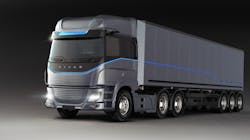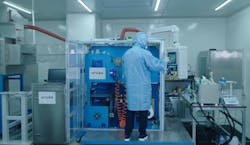Hyzon to produce critical fuel-cell components near Chicago
Hyzon Motors Inc., a supplier of heavy-duty fuel cell electric vehicles, plans to build the largest fuel cell membrane electrode assembly (MEA) production line for commercial vehicles in the United States at its new Hyzon Innovation Center located in Bolingbrook, Ill., just outside of Chicago.
At full capacity, the Hyzon Innovation Center should produce enough MEAs, the critical component of a fuel cell that account for about 70% of the cost of a fuel cell stack, to cover the production needs for up to 12,000 FCEVs every year. MEAs are currently produced in Canada, Europe, Japan, Korea and China at commercial scale. Smaller scale MEA production in the United States has so far been a supply and cost bottleneck for U.S. fuel cell vehicle production.
“We see a substantial uptake in Europe already, and anticipate North America will soon follow suit on this decarbonization journey for heavy transport," said Craig Knight, Hyzon CEO and co-founder.
Knight recently spoke to Fleet Owner about this journey, which included plans to go public by merging with a special purpose acquisition company called Decarbonization Plus Acquisition Corporation in Q2 of 2021. This will free up $626 million in cash to fund the current phase of operations and growth.
Production at the new facility is planned for Q4 of 2021, with 28,000 square feet of manufacturing space to start, before expanding in a second phase to 80,000 square feet. Hyzon expects to eventually fill up to 50 full-time positions at this production facility.
"The new Hyzon Innovation Center is essential to our strategy to expand the U.S. hydrogen supply chain, reduce fuel cell costs for commercialization, and create local jobs,” said George Gu, Chairman and Co-Founder of Hyzon. “We chose the greater Chicago area due to its top-tier universities, national labs, equipment companies and manufacturers, and a large pool of talent for recruiting a highly-skilled workforce. We are looking forward to empowering this unique ecosystem so that we can further accelerate the energy transition and decarbonize heavy road transport."
The Hyzon Innovation Center will also conduct research and development on materials for fuel cells, electrolyzers, solid-state batteries, advanced e-drive systems, autonomous driving technologies and green hydrogen production technologies.
In addition to the Hyzon Innovation Center outside Chicago, Hyzon has two facilities in Rochester, N.Y. – one serving as a fuel cell testing facility and the other as its US headquarters, fuel cell engine production facility, and vehicle integration center. Hyzon currently produces commercial vehicles at its facility in Groningen, The Netherlands, through a joint venture with Holthausen Clean Technology B.V.

